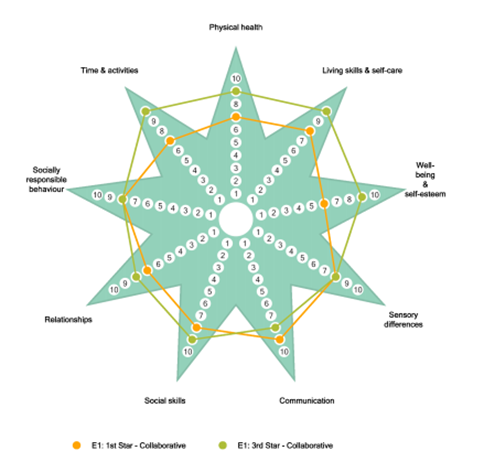This case study is about C, an individual who took part in Gwent IAS’ trial of ‘Brain in Hand’ (BiH.) Brain in Hand is ‘a digital self-management support system for people who need help remembering things, making decisions, planning, or managing anxiety’.
Key areas and challenges that were identified include:
- Physical health – specifically around improving sleep, booking health appointments and ordering repeat prescriptions
- Well-being and self-esteem – factors affecting C’s wellbeing include anxiety, depression, lack of structure/routine and adverse childhood experiences
- Time and activities – having more of an occupational balance between interests and household chores.

BiH has improved many areas of C’s life. In the begining we focused on addressing C’s issues with sleep. BiH proved invaluable in supporting C’s night time routine and improved their executive dysfunction to initiate and complete tasks that formed this routine. I helped C to incorporate sleep hygiene into their BiH and prompts to break away from interests to complete their night time routine in a timely manner. Visual schedules and reminders on BiH also enabled C to take medication and order repeat prescriptions on time.
C was able to use BiH to support them in many areas of their life and it was instrumental in helping to establish daily routines. I supported C to break household tasks down into manageable tasks and to schedule these throughout the week. This was beneficial due to a co-morbid diagnosis of Fibromyalgia. C attended the IAS’s ‘Managing Time & Improving Well-being’ course which explores visual schedules in more depth, looks at the concept of ‘Energy Accounting’ and sensory diets. The course and BiH had a positive effect on C’s ‘Well-being’ and ‘Time and Activities’ because they were able to maintain daily chores more effectively which introduced structure, and this in turn improved self-esteem.
After seven months of trialling BiH, 1:1 support and attending the IAS course, C felt more positive and started applying for jobs for the first time in sixteen years. C made it to the final interview with a national public organisation and although unsuccessful, C did manage to gain voluntary employment elsewhere helping people in crisis. BiH and support from the IAS has enabled C to gain a balance in life and be more equipped to maintain their health needs, keep on top of household chores, gain meaningful employment and still have time for their interests.

